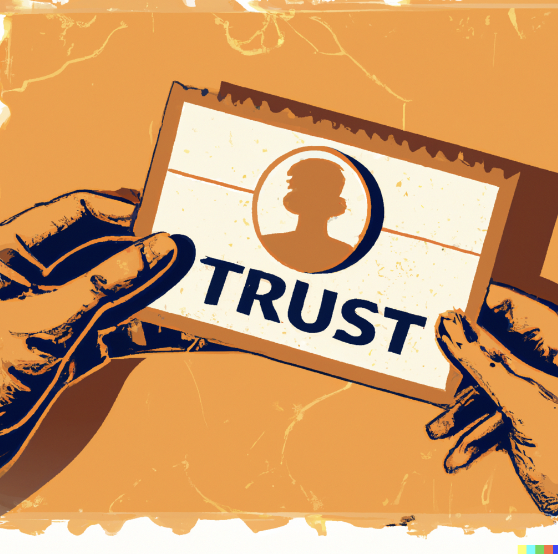Marketers know the importance of having consumers who trust your brand and messaging. Brands with high levels of trust have stable customer bases that stand the test of time and who are willing to experiment with the brand’s new products. According to data from Morning Consult, trusting audiences also provide the shelter that brands need to weather dreaded PR storms.
Cultivating that trust is a long-term strategy that depends on having a strong foundation of cohesive branding. Other strategies that support brand trust include consistency, positive customer experiences and community, and transparency about business operations.
Where, then, does blockchain fit into the equation?

The Verifiable Power of Blockchain
At the most basic level, blockchain offers a decentralized, public platform for recording transactions. With a little imagination, brands can work with this technology to verify important brand initiatives. For example, General Mills could record its donations to schools through the Box Tops program as an easily referenced public record of their commitment to kids’ education. BMW could use blockchain to register warranty claims on the i7 hybrid that was unveiled mid-2022, to build consumer trust of the brand’s new model.
Because the blockchain is an easily verifiable public record, brands can use it as a type of logbook for any key initiative that they want to spotlight in marketing to establish a stronger measure of trust among target audiences. Blockchain-based records offer a robust record of a brand’s actions and commitments to help promote trust.

Building Brand Trust with Proof of Authenticity
Once data is recorded on a blockchain, it becomes virtually impossible to alter or tamper with. The decentralized nature of blockchain, where multiple nodes validate and verify transactions, ensures the integrity of the information stored. Amendments may be made in the case of errors in the original data, but in all cases, both the original entry and the amendment will be clearly visible.
This tamper-proof attribute, which is unique among digital record-keeping platforms, enhances brand trust by eliminating doubts about data manipulation or deception. Brands that consistently do good work and keep contemporaneous records on the blockchain can point to this data as proof of their ongoing commitment to customer satisfaction and the values that the brand advocates for.

Blockchain Records: A Permanent Solution
Information stored on a blockchain remains permanent and immutable. This means that once a transaction is recorded, it becomes an indelible part of the blockchain’s history. Brands can leverage this feature to create an irrefutable record of their efforts in building trust, demonstrating long-term consistency and commitment to their audience.
Because trust is built over time, the more documentation a brand has in blockchain, the more those records can add to the public’s trust of the brand. After all, blockchain records cannot be tampered with, so data entered therein is free from accusations of tampering after it has been turned into a blockchain transaction.
This could be useful in, for example, firms subject to surprise audits or pharmaceutical companies looking to provide proof of their trial data and the ethical design of their research studies.

Harnessing Blockchain Records for Building Trust
With this understanding of blockchain’s unique features, we can explore in more depth how brands can utilize this technology to build trust and enhance their credibility:
Documenting Trust-Building Efforts
Blockchain enables brands to record their efforts to build trust in an auditable and transparent manner. By documenting initiatives on the blockchain, such as sustainability practices, community involvement, or fair-trade commitments, brands can provide stakeholders with a verifiable and immutable record of their actions. This level of transparency instills confidence in consumers by showcasing a brand’s day-in, day-out commitment to its values and fostering a higher level of trust.
Strengthening Customer Relations
Blockchain can enhance customer experiences by providing a secure and transparent platform for interactions, whether that involves answering customer questions, recording refunds, tracking warranty data, or other forms of customer service. Brands can leverage blockchain-based loyalty programs, where customers earn and redeem rewards securely, without concerns about data breaches or manipulation. Programs like Starbucks Odyssey are testing the advantages of blockchain in other customer relation use cases as well, such as customer ownership of loyalty rewards. These tactics strengthen the bond between brands and customers, fostering trust and loyalty over time.
Supply Chain Transparency
Blockchain technology can revolutionize supply chain management by offering end-to-end transparency. Brands can utilize blockchain to trace and record every step of the supply chain, from sourcing raw materials to manufacturing and distribution. This enables consumers to verify the authenticity, sustainability, and ethical practices associated with the products they purchase, and makes it easier for brands to uphold ethical sourcing commitments. With increased awareness and demand for transparent supply chains, blockchain is quickly becoming a powerful tool for building trust and meeting consumer expectations.
Verifying Product Authenticity
Counterfeit merchandise poses a significant challenge for luxury brands, eroding trust and damaging their reputation. Blockchain provides a solution by allowing brands to register their products on the blockchain, creating a unique and traceable identifier. Consumers can verify the authenticity of products by scanning the blockchain record, ensuring they are purchasing genuine items, even when buying on the secondary market. A similar process could be implemented to certify a brand’s trusted retailers, as opposed to or in addition to individual products. These practices instill confidence in consumers and protect the brand from the lost revenue and reputational risk associated with product counterfeiting.
Enabling Peer-to-Peer Trust
Blockchain-based peer-to-peer marketplaces create opportunities for individuals to transact directly with one another. Through smart contracts and decentralized platforms, brands can participate in these marketplaces as well, leveraging blockchain’s capabilities to enhance trust in the transactions. By engaging with customers in a peer-to-peer environment, brands can foster trust by providing secure and transparent transactions and treating the customer as an equal in the transaction, all the while removing the need for intermediaries to bog down the process.
Building Brand Communities
Community marketing focuses on nurturing relationships and facilitating interaction of all kinds—among customers, between customers and brands, and between brands and their customers. By cultivating a positive community on top of blockchain, brands can build trusting, authentic relationships with members of their target audience.
Learn more about the power of community for brand success.

In Conclusion
Building brand trust is a continuous journey that relies on consistency, positive customer experiences, and transparency. Blockchain technology amplifies these efforts by providing verifiable, tamper-proof records that are permanent. Brands can leverage blockchain to document their trust-building initiatives, strengthen customer relationships, ensure supply chain transparency, verify product authenticity, participate in peer-to-peer marketplaces, and record other public-facing initiatives. As the Web3 era continues to mature, it is essential for brands to embrace blockchain technology and unlock its potential in establishing and maintaining levels of trust. Brands can harness the power of blockchain to build long-lasting relationships with their customers, differentiate themselves in the marketplace, and position themselves as trustworthy leaders in their industries.



